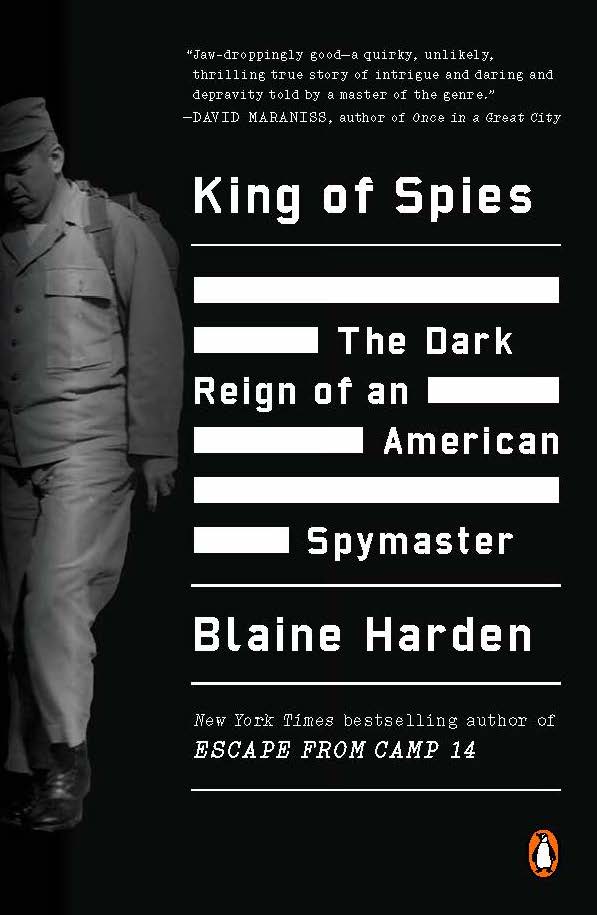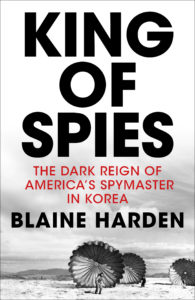King of Spies is the story of U.S. Air Force Major Donald Nichols, an intelligence agent who operated in Korea for 11 secret years with his own army of spies, his own base, and his own murderous rules.
The book casts new light on the U.S. role in the Korean War. More importantly, it explains—at a time when North Korea is threatening the U.S. with long-range nuclear missiles—the origins of an intractable foreign policy mess.
In 1946, master sergeant Nichols was repairing jeeps on the sleepy island of Guam when he caught the eye of recruiters from the army’s Counter Intelligence Corps. After just three months’ training, he was sent to Korea, then a backwater beneath the radar of MacArthur’s Pacific Command. Though he lacked the pedigree of most U.S. spies—Nichols was a 7th grade dropout—he quickly became a black ops phenomenon. He insinuated himself into the affections of America’s chosen puppet in South Korea, President Syngman Rhee, and became a pivotal player in the Korean War, warning months in advance about the North Korean invasion, breaking enemy codes, and identifying most of the targets destroyed by American bombs in North Korea.
But Nichols’s triumphs had a dark side. His closeness to Rhee meant that he witnessed—and did nothing to stop or even report—the slaughter of tens of thousands of South Korean civilians in anticommunist purges. Immersed in a world of torture and beheadings, he recruited agents from refugee camps and prisons, sending many to their deaths on reckless missions.
King of Spies traces Nichols’s unlikely rise and tragic ruin, from his birth in an operatically dysfunctional family in New Jersey to his sordid postwar decline, which began when the U.S. military sacked him in Korea, sent him to an air force psych ward in Florida, and subjected him—against his will—to months of electroshock therapy. King of Spies reminds us that the some of the darkest sins of the Vietnam War—and many other conflicts that followed—were first committed in Korea.
NPR podcast on US role in creating North Korea features King of Spies—Air Force Major Donald Nichols—as a dark star in a dark history.
A “page-turner that is difficult to put down… No one is better placed to write this story than Blaine Harden.” 38 North
“Fascinating but profoundly disturbing… A well-written page-turner.” CIA Center for the Study of Intelligence
“A masterful work of narrative history.” South China Morning Post
“A good yarn and a timely one.” The Washington Post
“A rip-roaring exposé of U.S. black ops.” Asia Times
“Engaging, instructive, sane and searching… Generously researched and ably told.” International Journal of Korean History
“Compellingly told… dark side” of an American spy” St. Louis Post Dispatch
“A must-read” that raises “troubling questions” about U.S. intelligence operations in Korea. Library Journal
“Timely… intriguing and carefully researched.” Popmatters
An Amazon best book of October
ABC News interview about King of Spies and North Korea.
Public Radio International report on the spy who was nearly forgotten
The Man Who Helped Burn Down North Korea Politico excerpt
Colonel Kurtz in North Korea Daily Beast excerpt
“Fascinating account of an espionage pioneer who thrived during the Korean War and then disappeared into disgraced obscurity. . . . ” Kirkus
Reveals “one of Cold War America’s most notable intelligence operatives… an exemplar of a war that most Americans never debated, let alone understood.” Publisher’s Weekly
Press about King of Spies and North Korea:
The New York Times: My Take on Trump v. Kim Jong Un
The Economist seconds my take on Trump v. Kim
Why Kim Jong Un is Alienating China in WaPo
Why Can’t China Control North Korea for PBS FRONTLINE
My interview about King Of Spies on WYNC
CNN interview with Christiane Amanpour
MSNBC interview with Alex Witt
Podcast from Oregon’s Jefferson Public Radio
Early Praise:
“Blaine Harden’s King of Spies is jaw-droppingly good — a quirky, unlikely, thrilling true story of intrigue and daring and depravity told by a master of the genre.”
—David Maraniss, author of Once in a Great City
“King of Spies is a dark story of espionage and evil by a wild American military spymaster in Korea, a tale both revelatory and tragic. Blaine Harden’s superb book throws open a long-ignored chapter in the Korean War; a compelling and disturbing read, not to be missed.”
—David E. Hoffman, author of The Billion Dollar Spy
“Blaine Harden has now produced a fascinating trilogy of stranger-than-fiction books about North Korea. His latest, King of Spies, is about a gay, middle school dropout who was one of the few U.S. officials to predict the outbreak of the Korean War and whose espionage activities had a profound impact on the course of the war. You’ve probably never heard of Donald Nichols, but you’ll never forget him after reading King of Spies.”
—Barbara Demick, author of Nothing to Envy
“Blaine Harden has unearthed one of the handful of Americans who supported, facilitated, and participated in the crimes of the South Korean dictators, shadowy men about whom people at home never hear… The author brings Nichols to life not as an evil character, but a fascinating man afflicted by early family pathology, deep insecurities, and a remarkable ability to get things done—to get anything done.”—Bruce Cumings, author of The Korean War: A History
“A thrilling real-life spy story told by a terrific writer.”
—Tim Weiner, author of Legacy of Ashes
“Blaine Harden has done what no one else thought to do in seven decades: He’s brought us the full, secret, astonishing story of one of the most improbably powerful characters in American history, and he has done so with crystalline writing and in jaw-dropping detail.”
—Steve Twomey, author of Countdown to Pearl Harbor
“Many accounts of the Korean War are full of mystery, hinting at horrific crimes and large-scale covert operations. King of Spies pierces that mystery through the story of a remarkable American operative who took his mission to mind-boggling extremes. The adventures that fill these pages, from bleak battlefields to the corridors of power, tell us much about how the world really works.”
—Stephen Kinzer, author of Overthrow
British edition
Pre-order:
•Mantle/Macmillan
•Amazon UK
King of Spies exposes on untold story of American military misbehavior in Korea…
It’s antihero is Donald Nichols, a 7th-grade dropout turned U.S. Air Force spy boss. His commanding generals called him a “one man war.” The generals gave Nichols his own secret base, his own secret army of Korean agents, and almost no supervision. Nichols said they also gave him “a license to murder.”
During his extraordinary 11-year tenure in Korea, Nichols would become America’s Kurtz. He operated in a shadowland of executions and torture, while sending hundreds of his agents to their deaths inside North Korea. His reign ended suddenly, when he was secretly removed from South Korea, locked up in a U.S. military hospital in Florida and subjected to 50 rounds of memory-obliterating electroshock.
The story of his rise and fall has not been told before. King of Spies is based on Nichols’s previously unreleased military service record, his psychiatric treatment notes, Syngman Rhee’s presidential papers, newly declassified air force records, family letters and photographs, unsealed court records in Florida, and interviews with American and South Korean intelligence officers who served with Nichols.
Before, during and after the Korean War, Nichols’s intelligence unit—called NICK—out-spied the CIA and Army intelligence. Nichols broke North Korean army codes, found weaknesses in Soviet tanks and fighter jets, and located most of the targets for American carpet-bombing and napalming of North Korea during the war. In the process, he secretly won 21 medals. including the Distinguished Service Cross, America’s second highest honor for battlefield valor.
Nichols was also a close confidant of South Korea’s first president, Syngman Rhee, at a time when Rhee’s security forces—in a fevered hunt for Communists—were killing more than 100,000 South Korean civilians, including women and children. Nichols trained Rhee’s sadistic police and worked with Rhee’s senior henchmen. A U.S. Army photo (published for the first time in my book) shows Nichols inspecting a severed head in a bucket on the roof of South Korean Army headquarters in Seoul. The U.S. military and the South Korean government covered up these killings for nearly half a century.
In 1957, fours years after the war ended, the U.S. military finally soured on Nichols. It spirited him out of Korea in a straitjacket, diagnosed him (wrongly) as “schizophrenic,” and forced him to undergo months of electroshock in the psych ward at Eglin Air Force Base Hospital on the Florida Panhandle. He told relatives that “the government wanted to erase his brain—because he knew too much.” He was then forced out of the air force. As a confused and often criminal civilian, he joined what he called the ranks of “the living dead,” with the FBI and local police periodically giving chase. He wrote an unreliable memoir in 1981 and died in a VA hospital in 1992.


